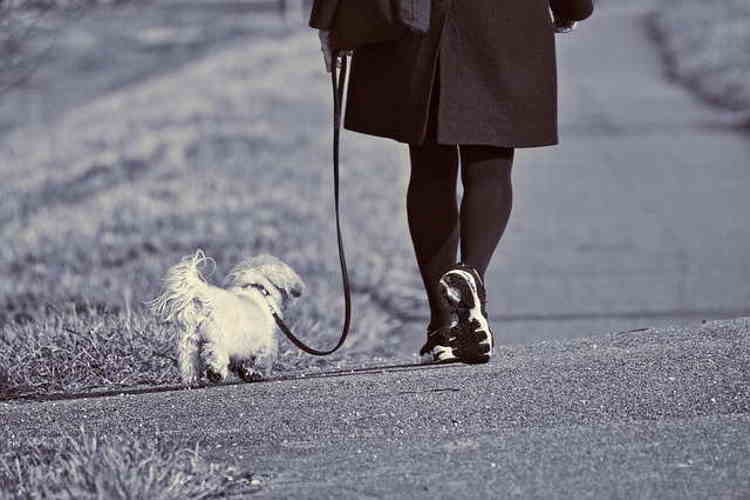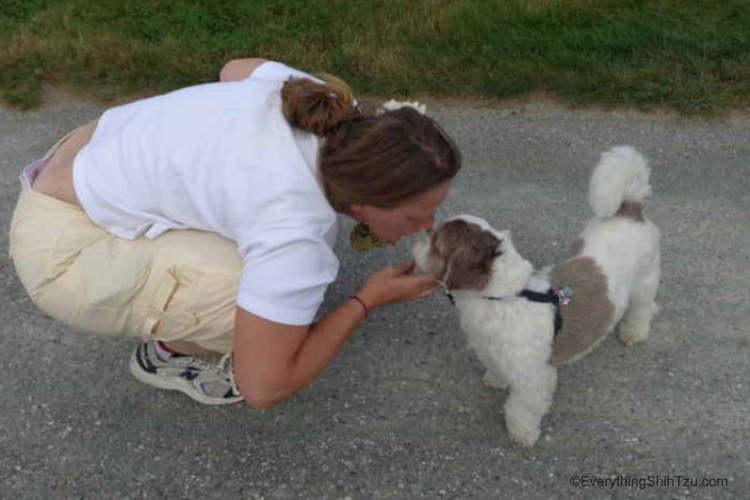What To Expect When You Adopt A Dog - Insight on Preparing For The Big Day
BY MOLLY | EVERYTHINGSHIHTZU.COM
If you’re ready to add a furry pal into the mix, then adoption is a great way to find a loving companion and give a dog a wonderful home.
Still, there are a lot of changes that come along with bringing a new pet into the household, so it’s important to know what to expect when you adopt a dog.

What should you know when you adopt a dog?
When adopting a new dog, you can expect that it will bring great joy to your home, but it will also bring more responsibility, increased financial obligations, and schedule changes.
Whether it's a puppy or an older canine, you will have to make changes in your daily life.
This will all be amplified if you adopt a puppy or a dog with health issues.
If the thought of all of these adjustments makes you nervous, just take a moment to really think things through, and consider if you truly want to adopt a dog.
If the answer is yes, then the more prepared you are for the experience of adoption, the more likely your partnership with your new best friend will be a success.
What Changes Occur When You Adopt a Dog?
If you’re excited about adopting a new pup, then sometimes the realities of what bringing a new pet into your home entails can get lost in the joy of the occasion.
This is understandable.
Dogs are cute, they’re loving companions, and they can bring a lot of happiness into your life.
However, dogs also come with a lot of responsibility.
Whether you’re already a pet owner or this will be your first pet, when you bring a dog into the mix, things will change.
If you’re adding another animal to your house, you will have the added financial responsibilities and time it takes to care for more animals.
If this is your first dog, then you’re in for many changes and a whole adjustment to the way you live your life.
This isn’t a bad thing; it’s just different.
So what are some things that you can expect to happen when you adopt a dog?
Here are a few items to consider:
ADJUSTMENT PERIOD
The initial time it takes to help your pet adjust to his new surroundings can last for a while.
Be prepared to devote a lot of time to your new pet in the first few weeks that he is in your home.
Some dogs can take up to a year or more before they feel fully comfortable, depending on what their background is and where they come from before moving in with you.
It’s important for you to know that this is a strong possibility and to decide if you are willing to do what it takes to help your dog get acclimated and comfortable with his new surroundings.
INCREASED EXPENSES
You’ll have to add a line in your budget for pet care, which can get pretty expensive depending on the dog.
You’ll have vet bills, of course, and then there are all of the items you will need to buy for your pup:
- dog food
- treats
- heartworm\flea prevention
- grooming supplies
- toys
- leash and collar
- poop bags
- a dog bed
- a crate
- and any other items that your pup might need.
If your dog has high-maintenance grooming needs, you may need to consider adding in the cost of professional grooming services.
SCHEDULE CHANGES
Your schedule is going to have to change, at least at first.
This is especially true if your new friend is not yet potty-trained.
You may discover that sleeping through the night is not an option during the first week, as your pal wakes you up at 3 am to go outside.
If you adopt a puppy, then you'll need to spend a lot of time at home with him in the beginning, so honestly, consider if your schedule allows for that.
If not, can you hire someone or ask a friend to come to your house during the day and play with your pup or let him outside while you're at work?
Your dog’s schedule will be different from yours, so it will take some time for him to get into the groove of how a day in your life works.
TRAVELING
Traveling and vacations will not be the same.
Maybe you don’t really travel that much, so this might not be a big deal for you.
But if you are used to just picking up and going on a new adventure, whether for a week’s vacation or just a weekend getaway, it’s not going to be as easy with a pet.
Depending on your financial situation, you could just board your dog whenever you are ready to go out of town.
But if you leave very often, this might not be very fun for your canine companion.
However, boarding can get expensive, so other options could be a friend or family member that is willing to dog sit or finding hotel accommodations that allow dogs (usually for an added fee).
No matter which way you slice it, adding a pet into the mix will make traveling a bit more expensive, and it gives you another thing to think about when you are planning your trip.
VISITORS TO YOUR HOME
A new dog could affect who comes to your house.
This might not be a deal-breaker for you, but if you have a close friend or family member that visits often and has a bad dog allergy, then that person may no longer be able to come over to your house.
How Do You Prepare for Your Adopted Dog?
If you are ready and willing for all of these changes that come with a new dog, your next step is to make sure you’re prepared for your new addition.

There might be some alterations that you need to make in your house or your backyard to accommodate your new friend.
There are also adjustments you may need to plan for in your schedule before you bring your dog home.
Here are a few suggestions on how you can prepare for your adopted dog:
1. Make a List
First things first, make a list of everything you want to prep before you get your pup.
Also, make a list of any supplies you will need for your new pal.
A sample list might look something like this:
- Dog Crate
- Dog Bed
- Toys
- Chew bones
- Dog food
- Treats
- Grooming supplies: shampoo, brush/comb, nail clippers, dog toothbrush, and toothpaste, detangling spray (if applicable), leave-in conditioner
- Leash (or harness) and collar
- Heartworm/Flea Prevention
- Set up an appointment with the vet (find a vet if you don’t already have one)
- Fix loose boards in the backyard fence so the dog cannot get out of the yard
- Puppy proof the house (keep cabinets closed, put trash cans inside cabinets, etc.)
- Familiarize yourself with where the nearest animal emergency clinic is and have the phone number in a handy place
- Make a designated sleeping area for your pet
- Make a list of local groomers
This is not a definitive list, but it is a good start, and you can add things to it that are unique to your individual situation.
For example, if you live in an apartment, you will need to verify that your complex allows pets. Check to see if there will be a pet deposit due or any monthly rent increase if you have a dog in the apartment.
2. Preplan and Adjust Your Schedule
Decide when the best time to bring your new pet home will be and plan accordingly.
Set up your schedule ahead of time, and plan and be home as much as possible during the first week that you are with your new pet.
If you know that during the week it will be rough to be home most of the time, then plan to adopt your dog on a weekend so that you at least have a few solid days together in the beginning.
Also, if you know you are going out of town, don’t adopt your dog within the few weeks before your trip.
3. Know What Your Rules Will Be
Before you bring your dog home, it’s important to know what you will be okay with him doing and the things that you are not going to allow.
The best way to train your pet is to be consistent and straightforward from the get-go.
If you waffle on all of your commands and rules, this is just going to confuse your dog and make training more difficult.
Therefore, know ahead of time things like:
- Will you allow your dog on the furniture?
- Will you let your dog sleep in your bed?
- Will your dog have constant access to his dog food, or will you have designated feeding times?
- Will you let your dog have access to the entire backyard?
Things like this are important to know ahead of time.
If your dog comes home and jumps on the couch, and you aren't sure yet if that’s okay, then your dog won’t be sure either.
Set your rules and be ready to lay down the law from day one.
4. Think About Your Daily Doggy Routine
Have a schedule ready for your pup.
For example, a morning walk followed by breakfast and playtime, and then an afternoon walk when you get home from work.
Set time aside to play with your pup when you are home, then perhaps it's dinner time, followed by an evening walk, and the night ends with quiet time and bed.
Also, remember grooming when you work out your daily routine.
Depending on the breed of dog you choose, daily grooming can be very minimal to very involved.
You'll want to designate a time each day for brushing your dog's teeth, wiping or cleaning his eyes, washing his face, and possibly daily brushing.
You'll also want to have a routine in place for nail trims, grooming sessions, and any other special attention your pooch requires.
5. Create a Special Place for Your Dog
Your dog, just like you, deserves to feel safe and secure.
Providing a special area for your pet will help your dog feel comfortable.
This area can be a particular corner of a room where you put his dog bed, food and water bowls, and his toys.
You can also set up a special place for your pet in multiple rooms.
A dog crate left open with comfortable bedding inside of it can also be a great option as it helps your dog feel secure.
Depending on how often your dog will spend time outside, you can also provide a designated area for him in the yard or on your patio, like a dog house or outdoor bed.

How Do You Get A Rescue Dog to Trust You?
After you've made all of the necessary preparations to bring your adopted dog home, your journey as a new pup parent is really just beginning.
You might have all of the supplies ordered, your plan of action in place, and a schedule mapped out and ready to go, but that doesn't mean your dog will magically accept everything right from the start.
Just as you need to get familiar with your new friend, your dog must get to know you.
Animals all have unique personalities, and some dogs are naturally more open and friendly than others.
Some dogs trust new people easily, while others take a long time to warm up to someone new.
Often, the dog’s background can play a significant role in his level of trust. For example, if the dog was abused or abandoned, he will take a lot longer to feel completely comfortable in his new environment.
For some dogs, trust comes in stages over time, and those dogs that come from tough situations may take up to two years before they are 100% trusting of their new owners.
To gain your dog’s trust, think about the people you know you can depend on in your life.
You probably trust your friends that tell it like it is, have your back, are kind to you, help you, and don't send you mixed messages.
Take a cue from these traits as you learn how to interact with your dog.
Never strike your dog, give him positive praise and rewards for desired behaviors, and spend time with your pup.
Playing with your dog, taking walks together, brushing your dog, and even just chilling together on the couch (if he’s allowed on the furniture) are great ways for you and your pup to bond.
The more opportunities you have to spend quality time with your dog, the deeper the bond between you can grow.
You need to be the one that feeds your dog, gives him water, scratches behind his ears, trains him, and rewards him.
He will associate these things with you and soon learn that you're the boss, the alpha dog, and eventually earn his respect and trust.
Stay patient with your pup, but firm in those times that he makes mistakes.
Don't yell and scream at your dog, and don't even think about swatting him with the stereotypical rolled-up newspaper.
All of this negative behavior does is set the time back on the “trust” clock; you'll lose valuable footing with your pet, and the trust that you've managed to establish up until that point will take a big step backward.
You definitely don't want to have to hit the reset button.
If it helps, remind yourself that your dog, as intelligent as he is, is not doing anything wrong out of malice or to spite you.
He doesn't have these kinds of emotions or urges.
He just needs guidance and encouragement and a loving home to help shape him into the amazing dog he is meant to be.

Hopefully, if you’re planning on adopting a dog, whether it’s a Shih Tzu or another breed, this has helped give you a better sense of what to expect.
When you can properly prepare for your new housemate, you can have a better chance of a compatible relationship.
Check out our blog for our series of posts on dog adoption to get even more helpful tips and info on the process.
One more thing you can expect when adopting a dog is the greatest satisfaction you will have in knowing that you are giving a homeless dog a forever home.
Wishing the very best for you and your new-found furry friend!
- Home
- Dog Adoption
- adoption expectations



